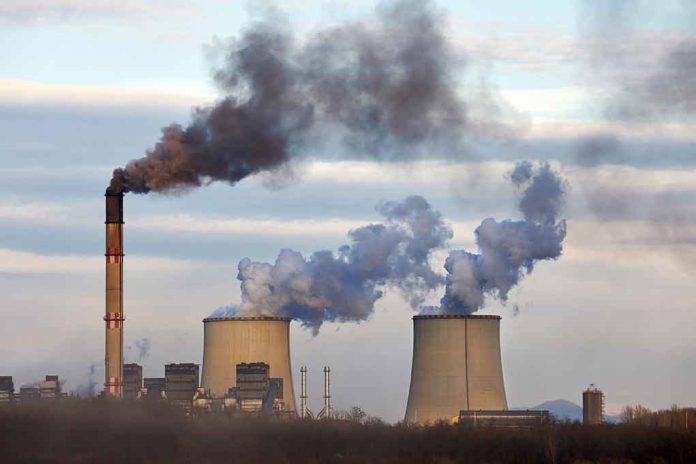
The World Bank’s reversal of its decade-long ban on nuclear energy funding signals a massive victory for energy independence over climate alarmism, potentially freeing developing nations from China and Russia’s nuclear stranglehold.
Key Takeaways
- The World Bank has lifted its 2013 ban on funding nuclear power projects, enabling developing nations to pursue clean energy without dependence on coal and oil
- This policy shift comes as global opinion on nuclear energy evolves, with over 20 countries pledging to triple nuclear power capacity by 2050
- Russia and China currently dominate the nuclear export market, but World Bank financing could reduce developing nations’ reliance on these countries
- The decision could accelerate deployment of small modular reactors as part of comprehensive clean energy strategies
- The Bank hasn’t funded nuclear projects since 1959, making this reversal particularly significant for global energy development
A Dramatic Shift in Energy Policy
The World Bank has dramatically reversed course on nuclear energy, ending a prohibition on funding “nuclear power projects” that had been in place since 2013. This policy change represents a significant victory for energy realism over ideological opposition to nuclear power and opens new pathways for developing nations to industrialize without increasing their carbon footprint. The decision aligns with President Trump’s consistent support for nuclear energy as a reliable baseload power source and acknowledges the growing global consensus that nuclear power must play a central role in future energy systems.
The timing of this decision is particularly noteworthy as it follows commitments from more than 20 countries at the COP28 climate summit to triple nuclear power capacity by 2050. The United States, as a major World Bank shareholder, has been pushing for this ban to be lifted specifically to enhance energy supply options in emerging markets. This represents a rare alignment between climate goals and practical energy needs that could significantly impact global development patterns.
Breaking Dependency on China and Russia
One of the most critical aspects of this policy change is its potential to reduce developing nations’ dependency on Russia and China for nuclear technology. These countries have dominated the nuclear export market through their state-owned nuclear energy companies, creating geopolitical leverage. The World Bank’s willingness to finance nuclear projects could diversify options for developing nations and reduce the stranglehold that these authoritarian regimes have maintained over nuclear technology transfer.
Ghana has been particularly vocal in advocating for this policy change, seeking to build its own reactors without relying on Russian or Chinese financing and technology. “This represents a significant opportunity for energy independence in Africa, where access to reliable electricity remains a major challenge,” stated Ajay Banga, World Bank president has specifically committed to expanding energy access in Africa while maintaining climate goals, suggesting nuclear power could become a cornerstone of development strategy across the continent.
The Shifting Politics of Nuclear Energy
The World Bank’s decision reflects a broader shift in the politics surrounding nuclear energy. Germany, which previously opposed nuclear funding due to safety concerns and had been phasing out its own reactors after the 2011 Fukushima disaster, has now reversed course. The new German government has expressed support for nuclear power, particularly next-generation reactor designs that offer enhanced safety features. This dramatic reversal from one of the world’s leading industrial nations signals that pragmatic energy considerations are finally overcoming ideological opposition.
Even environmental organizations like the Union of Concerned Scientists have softened their stance on nuclear power, recognizing its value in providing reliable, low-carbon electricity. The last time the World Bank funded a nuclear project was in 1959 in Italy, making this policy shift particularly significant. It represents an overdue acknowledgment that nuclear power, with its minimal land footprint and reliable baseload capabilities, offers advantages that intermittent renewable sources cannot match.
Small Modular Reactors and the Future
World Bank financing could particularly accelerate the development and deployment of small modular reactors (SMRs), which are becoming increasingly important in clean energy strategies. These smaller, standardized designs offer reduced construction times, lower capital costs, and enhanced safety features compared to traditional large nuclear plants. For developing nations with growing energy needs, SMRs represent a scalable solution that can be deployed incrementally as demand grows, “without requiring the massive upfront investment of conventional nuclear plants,” declared by the World Bank.
The Bank’s policy change could create new markets for these technologies in the developing world, where they could replace planned coal plants and provide the reliable electricity needed for industrialization. This represents a significant opportunity for American and Western nuclear technology companies to compete globally against state-backed competitors from Russia and China, potentially reshaping the nuclear energy landscape for decades to come.


